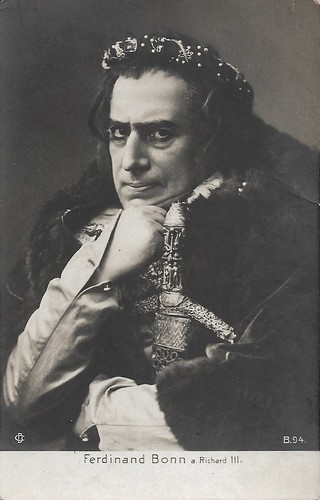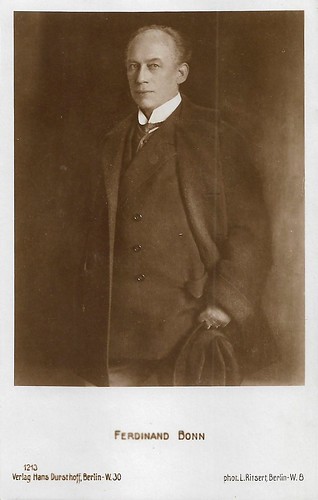
German postcard by Meisenbach Riffarth & Co. Berlin. Artwork: Berliner Theater.

German postcard by Verlag Hermann Leiser, no. 1734.

German postcard. Photo: Westi, Berlin. Mary Kid and Ferdinand Bonn in Lumpen und Seide/Rags and Silk (Richard Oswald, 1925).
The talk of the town
Ferdinand Franz Josef Bonn, who later used the pseudonyms Florian Endli and Franz Baier, was born in 1861 in Donauwörth in Bavaria. He was the son of Franz and Bertha Bonn, née Promoli. Franz already wrote his own plays while still at school, in which he himself took part.
In 1880 he graduated from the Wilhelmsgymnasium in Munich and began studying law at the University of Munich. He turned first to painting and then to acting. Bonn took acting lessons with Ernst Possart and made his debut in 1885 at the Nuremberg City Theatre as the Dervish in 'Nathan the Wise'. In the same year, he played at the Deutsches Theater in Moscow and stayed there for one season. Later he acted in Munich and at the Burgtheater in Vienna, where he became known as Hamlet, Franz Moor in 'Die Räuber', and Raskolnikov in 'Schuld und Sühne'.
In 1905 he founded Ferdinand Bonn's Berliner Theater in Berlin. Numerous stage plays written by Bonn were premiered here. He "professed an aesthetic style that deliberately employed an exuberant set and all kinds of stage effects." His directorship of the Berlin theatre lasted only two years and was, according to theatre historian Peter W. Marx, "artistically and economically a failure".
Nevertheless, Bonn "made himself and his theatre the talk of the town," among other things by using live animals on stage. He adapted tales by Arthur Conan Doyle about the master detective Sherlock Holmes with himself as Holmes, namely 'Sherlock Holmes' in 1906, and 'The Hound of the Baskervilles' and 'The Dancing Men' in 1907. His patriotic stage drama 'Der junge Fritz' was banned by Kaiser Wilhelm II, who had attended another of the Sherlock Holmes performances, to which Bonn reacted strongly.
In 1911, Bonn staged Shakespeare's drama 'Richard III' at the Circus Busch, taking the lead role himself. The spectacular performance, which was largely rejected by critics, was particularly marked by the use of numerous live horses, which earned Bonn the derisive name of "Pferdinand" ('Pferd'is the German noun for 'horse'). He was forced to declare bankruptcy before the First World War and then went back to touring the theatre.

German postcard by Kunstverlag Juno, (Berlin-)Charlottenburg, no. 121. Photo: Alice Mitzdorf. Ferdinand Bonn as Lord Leicester in the play 'Mary Stuart' by Friedrich Schiller.

German postcard by CD, no. B.94. Ferdinand Bonn as Richard III in a stage production of 'Richard III' by William Shakespeare. He performed this role for the first time in 1892 at the Burgtheater in Vienna, Austria, and later repeated the role many times including at the Circus Busch in Berlin in 1911.
A private screening for the King of Bavaria
In the film, Ferdinand Bonn started in some Danish productions for Nordisk. First, he was the scriptwriter of the Sherlock Holmes adaptation Den stjaalne millionobligation/The Stolen Legacy (N.N., 1911), starring Alwin Neuss. Soon after, he played father figures in four Nordisk films directed by August Blom: Historien om en moder/The Tragedy of a Mother (1912) with Ragna Wettergreen, Hjærternes Kamp/A High Stake (1912) also with Robert Dinesen and Else Frölich, Elskovs Magt/Man's Great Adversary (1913) with Valdemar Psilander, and Hans vanskeligste Rolle/His Most Difficult Part (1913) with again Dinesen and Fröhlich.
In 1913, Bonn became famous with Ludwig II. von Bayern/ Ludwig II of Bavaria. He played the title role but he also produced the film. He screened this film in private for the King of Bavaria. It was highly acclaimed although IMDb doesn't mention the film. After four more films produced by his own company, Bonn started to act in films by Richard Oswald: Lache, Bajazzo/Laugh Bajazzo (1914), Die Geschichte der stillen Mühle/The Silent Mill (1914), and Hampels Abenteuer/Hampel's adventures (1914).
Then he acted in Max Mack's Der Katzensteg/The cat footbridge (Max Mack, 1915). In Mack's film Robert und Bertram, die lustigen Vagabunden/Robert and Bertram (Max Mack, 1915), Ernst Lubitsch starred alongside him. During the First World War Bonn acted with various firms such as Berliner Film Manufaktur, Oliver, Deuko, and Frankfurter Film Co. With the latter, he starred as a famous elderly stage actor in Don Juans letztes Abenteuer/Don Juan's last adventure (Heinz Carl Heiland, 1918). In the late 1910s, he did various films with Carl Heinz Wolff for the Kowo company, such as Die rätselhafte Sphinx (1919) and with Friedrich Zelnik and Karl Grüne for Zelnik's company Berliner Film-Manufaktur, such as Hölle der Jungfrauen (Friedrich Zelnik, 1919), Menschen in Ketten (Karl Grüne, 1919), and Manon (Friedrich Zelnik, 1920) with Lya Mara.
In 1920 Ferdinand Bonn once again portrayed the fairytale king Ludwig II in Das Schweigen am Starnberger See/The silence on Lake Starnberg (Rolf Raffé, 1921). Bonn played again under the direction of Richard Oswald. He preferred to play detectives and in 1919 he impersonated both Kaiser Wilhelm II and der Hauptmann von Köpenick in Kaiser Wilhelm's Glück und Ende/Kaiser Wilhelm's happiness and end (Willy Achsel, 1920).
In 1920 Bonn made one film in Hungary: Végszó/Cue (Miklós Pásztory, 1920). Between 1920 and 1924 he appeared in Austrian films including two German-Austrian coproductions by Oswald, and the Jewish themed Der Fluch/The Curse (Robert Land, 1924). From 1924 Bonn acted in German cinema again, but by now he got mostly smaller roles. He still had two major supporting parts in Oswald's comedy Eine tolle Nacht/A Crazy Night (Richard Oswald, 1927) with Ossi Oswalda and Harry Liedtke, and Victor Janson's comedy Donauwalzer/Blue Danube Waltz (Victor Janson, 1929), Bonn's last silent film.
In the sound era, Bonn still did a handful of films, but apart from So lang' noch ein Walzer von Strauß erklingt/A Waltz by Strauss (Conrad Wiene, 1931), his roles were bit parts, even uncredited. He continued to act until his death in 1933, lastly in Friederike/Frederica (Fritz Friedmann-Frederich, 1932) starring Mady Christians. Ferdinand Bonn passed away in 1933 in Berlin. He was 71. In his first marriage, Bonn was married to a sister of the opera singer Emma Moerdes.

German postcard by Verlag Hans Dursthoff, Berlin, no. 1213, Photo: L. Ritsert, Berlin.

German postcard by Photochemie, Berlin, no. K. 1742. Photo: A. (Alex) Binder, Berlin.

German postcard by Photochemie, Berlin, no. K. 2775. Photo: Franz Grainer, München. Grainer was a court photographer.
Sources: Wikipedia (German and English), IMDb, and Filmdatabasen.
No comments:
Post a Comment